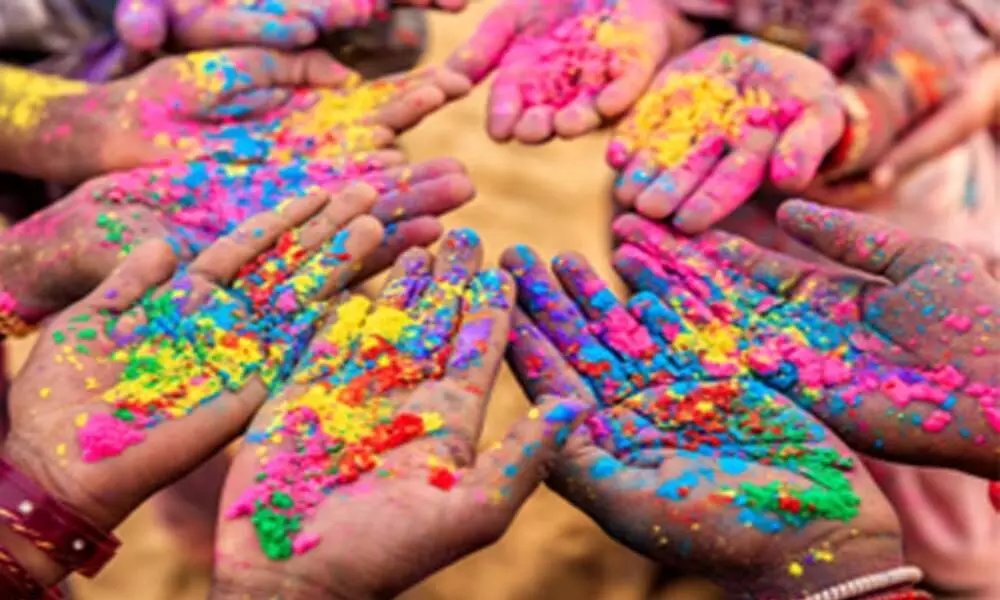5 startups that hope to change the way we play Holi
The organic, homegrown trend has spawned an entirely new segment of startups—ones that ensure our festivals are sustainable to an extent. While markets continue to be flooded with organic food and fashion brands, there is a small space opening for organic, eco-friendly Holi colours and smokeless diyas, for instance.
image for illustrative purpose

The organic, homegrown trend has spawned an entirely new segment of startups—ones that ensure our festivals are sustainable to an extent. While markets continue to be flooded with organic food and fashion brands, there is a small space opening for organic, eco-friendly Holi colours and smokeless diyas, for instance.
An interesting startup in this space is Phool, which was nurtured on the ghats of the Bithoor neighbourhood in Kanpur, Uttar Pradesh. This is where Ankit Agarwal dreamt of, and set up, his temple flower recycling startup after what he calls a 'depressing dialogue' with his visiting Czech friend, Jakub. While today they upcycle almost 4.7 tonnes of floral waste - discarded by temples every day - into incense sticks, vermicompost and incense cones, they have expanded into organic colour this year.
"Phool's rich colours are made from recycled flowers, herbs, rice and wheat powder and are certified by Centre for Cruelty Free Testing," says Agarwal. "They contain essential oils, have a lovely fragrance and are very easy to wash off. We attempt to revive the lost tradition of making Holi colours from natural ingredients such as flowers."
Deep from within the Bhil tribal lands in Udaipur comes Abeer, a natural gulaal. The Bhils, backed by Monk Bouffe, a social enterprise working on food, farming and nutrition issues, produce vibrant pink, green, orange, and yellow colours made from Gagangiri rose petals, beetroot, indigo, turmeric from the region of Mewar, and lemongrass and locally sourced Palash flowers. Set up in 2016 by three friends, it is now headed by Gaurang H. Motta and Saurabh Motta.
Abeer comes from the Bhil tribal lands in Udaipur.
"We work with farmers and farmer groups that believe in ecological methods of farming and create value-added products that can be a source of nutrition," says Gaurang, co-founder and CEO of the enterprise.
With the Holi colours, they have expanded to an entirely new segment.
From the plains of India to its mountains—AVANI, a Kumaon-based cooperative, collaborates with local communities on a rural development programme and sustainable businesses run by women. At AVANI, a variety of natural fibres and materials are used to create artisanal products.
"We work with textiles using several species of rare plants and trees that provide dye materials to produce colours such as brown, yellow, orange, red, blue, and violet. We are colouring natural fibres such as wool, silk, pashmina and linen with locally available dye plants, natural soap using soap nut tree, organic kumkum made from turmeric grown and collected at the AVANI centre, non-toxic watercolours from natural dye-yielding plants, and now an organic range of Holi colours in five shades," says Rashmi Bharti, co-founder of AVANI.
Locally foraged ingredients such as Himalayan Indigo, Tesu flower, turmeric, lac, and rice flour are pounded together to make the colours.
TWF Flours, a Delhi startup, calls itself a tech enterprise in the food and farming space. It has used technology to reimagine flours to unlock their nutrition potential.
"We employ data and complex modelling to reinvent every aspect of flours—from grain selection to grinding," says co-founder Pranjal Kumar. "We test and test and test scores of grains to pick just the best."
TWF now extends its tech might to organic Holi colours under the brand name, Haute Teinte. Wheat and corn are the common raw material in all three colours – for yellow, they blend it with saffron, turmeric and marigold; for green, with green apple, spinach, neem, and henna; and for pink with cranberry, pomegranate, rose and beetroot.
"We have derived an apt ratio of ingredients that give you fragrant, vibrant and beautifully textured Holi colour," says Kumar.
The aromatherapy supplies company All Naturals extends its range to herbal gulaal, made with ingredients such as flowers, leaves, spices, and maize starch. These are made in collaboration with prisons, in a venture that employs several former prisoners.
Promoters Harleen and Ankur set up the enterprise in 2014 as an essential oil export business, before expanding into retail with essential oils, clays, and bath salts. They term themselves a 'startup in the Holi colour space' and leverage their knowledge of aromatherapy and a vast network of farmers from whom they source natural and raw ingredients for the Holi range.
While these are some major players in the organic colour space, a range of small and medium-sized startups such as My Pooja Box in Delhi and Green Practices put out products, including Holi colours, that have natural materials as base ingredients.

